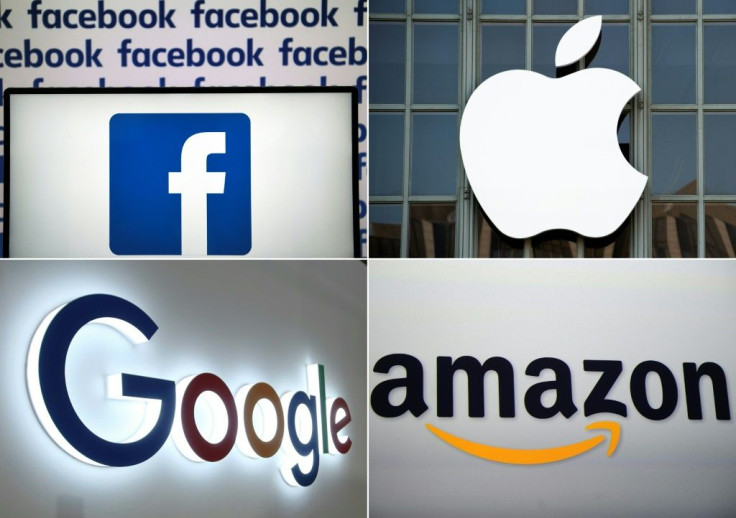Trump Immigration Crackdown: Tech Giants Like Google, Apple, Amazon, Others Slam Executive Order Limiting Visas

President Trump’s expansion of immigration limits has now drawn condemnation from major technology giants, including Google, Tesla, Amazon, Apple and more. The companies have taken issue with the suspension of the L-1 visa, which allows for the transfer of overseas staff, and the H-1B visa, which allows for the hiring of skilled foreign workers in a number of fields.
Trump signed the executive order Monday with the limitations beginning on June 24 and lasting until at least the end of 2020. The Migration Policy Institute estimates that the order will impact around 219,000 immigrant workers.
The response from tech executives was swift.
“Immigration has contributed immensely to America’s economic success, making it a global leader in tech, and also Google the company it is today,” Google CEO Sundar Pichai said on Twitter. “Disappointed by today’s proclamation — we’ll continue to stand with immigrants and work to expand opportunity for all.”
Immigration has contributed immensely to America’s economic success, making it a global leader in tech, and also Google the company it is today. Disappointed by today’s proclamation - we’ll continue to stand with immigrants and work to expand opportunity for all.
— Sundar Pichai (@sundarpichai) June 22, 2020
“Like Apple, this nation of immigrants has always found strength in our diversity, and hope in the enduring promise of the American Dream,” Apple’s Tim Cook said in a tweet. “There is no new prosperity without both. Deeply disappointed by this proclamation.”
YouTube CEO Susan Wojcicki, who is of Polish and Russian-Jewish descent, also highlighted her own family’s history as immigrants.
“Immigration is central to America's story, and it's central to my own family's story,” Wojcicki said in a tweet. “My family escaped danger and found a new home in America.”
Immigration is central to America's story, and it's central to my own family's story. My family escaped danger and found a new home in America. @sundarpichai is right - at @YouTube, we join Google in standing with immigrants and working to expand opportunity for all. https://t.co/ExJ5KT84ix
— Susan Wojcicki (@SusanWojcicki) June 23, 2020
“In my experience, these skillsets are net job creators,” Tesla CEO Elon Musk said in a statement on Twitter. “Visa reform makes sense, but this is too broad.”
The New American Economy (NAE) research firm has released extensive data about the breadth of immigrant workers in major American industries. The NAE also condemned Trump’s order as “bad policy and bad economics” at the start of an extensive Twitter thread.
THREAD: Today, President Trump announced an Executive Order expanding his immigration ban to include even more immigrants, including in industries like tech, manufacturing, seafood and hospitality.
— New American Economy (@NewAmericanEcon) June 22, 2020
Let us tell you, by the numbers, why this is both bad policy and bad economics.
According to NAE, roughly 1 in 4 information technology workers — the fastest-growing job sector in the U.S. — are immigrants and there are roughly 1.2 million. Within that field, almost 40% of software developers, or around 529,000 workers, are immigrants. Immigrants also make significant percentages of all IT workers in major tech hubs like New Jersey and California.
The immigrant-friendly IT field has a major presence in numerous industries, including but not limited to healthcare, retail, finance, and education.
“As we face huge public health and economic challenges, immigrants are on the front lines helping us respond to both,” NAE Executive Director Jeremy Robbins said in a statement. “Yet even as they fight alongside Americans, they are under continuous threat from Washington DC. They are excluded from federal relief efforts (as are their U.S. citizen spouses), they are at risk of deportation if they are undocumented, and now legal workers that drive essential industries won’t be able to enter the U.S. to spur additional job creation and help drive the economic recovery. This is not the path forward, and we must all speak out against this harmful Executive Order.”
There are also worries about how the immigration policy will weaken the U.S. in the global economy. Aaron Levie, CEO of enterprise cloud company Box, noted that such policies could mean the next Google would be created overseas.
In the digital economy, you hire where the talent is. When you restrict immigration, the jobs still get created, just somewhere else. And later down the road, when those individuals create the next Google, it won’t be here.
— Aaron Levie (@levie) June 22, 2020
The immigration crackdown by the Trump administration contradicts needs made my former acting chief of staff Mick Mulvaney in February.
“We are desperate — desperate — for more people,” Mulvaney told a crowd in England. “We are running out of people to fuel the economic growth that we’ve had in our nation over the last four years. We need more immigrants.”
© Copyright IBTimes 2025. All rights reserved.





















